

Inside Story - Facebook's privacy policy. Privacy concerns with social networking services. Social networking sites vary in the levels of privacy offered.
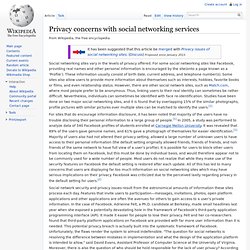
For some social networking sites like Facebook, providing real names and other personal information is encouraged by the site(onto a page known as a ‘Profile‘). These information usually consist of birth date, current address, and telephone number(s). Some sites also allow users to provide more information about themselves such as interests, hobbies, favorite books or films, and even relationship status. However, there are other social network sites, such as Match.com, where most people prefer to be anonymous. Thus, linking users to their real identity can sometimes be rather difficult.
Lawmakers Can't Keep Up with Technology. Vivek Wadhwa Employers can get into legal trouble if they ask interviewees about their religion, sexual preference, or political affiliation.
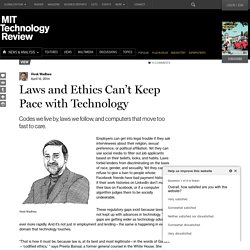
Yet they can use social media to filter out job applicants based on their beliefs, looks, and habits. Laws forbid lenders from discriminating on the basis of race, gender, and sexuality. Yet they can refuse to give a loan to people whose Facebook friends have bad payment histories, if their work histories on LinkedIn don’t match their bios on Facebook, or if a computer algorithm judges them to be socially undesirable. These regulatory gaps exist because laws have not kept up with advances in technology. “That is how it must be, because law is, at its best and most legitimate—in the words of Gandhi—‘codified ethics,’ ” says Preeta Bansal, a former general counsel in the White House. Take the development of copyright laws, which followed the creation of the printing press.
Our laws and ethical practices have evolved over centuries. Phila. Bar Association Issues Guidelines on Social Media Use. A recent Philadelphia Bar Association ethics opinion detailing how lawyers may instruct their clients on the use of social media provides greater clarity to lawyers caught in the middle of a constantly "evolving" digital landscape, some attorneys said.
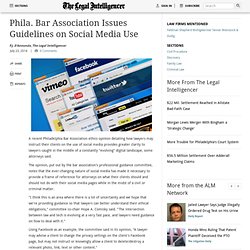
The opinion, put out by the bar association's professional guidance committee, notes that the ever-changing nature of social media has made it necessary to provide a frame of reference for attorneys on what their clients should and should not do with their social media pages while in the midst of a civil or criminal matter. "I think this is an area where there is a lot of uncertainty and we hope that we're providing guidance so that lawyers can better understand their ethical obligations," committee co-chair Hope A. Comisky said. "The intersection between law and tech is evolving at a very fast pace, and lawyers need guidance on how to deal with it. " The opinion listed a case in the Jefferson County Court of Common Pleas, McMillen v. A privacy paradox: Social networking in the United States. Did Facebook Break The Law? Senator Asks FTC For Answers. Privacy as a Premium: Say Goodbye to the Free Internet. The concept of privacy changed once it went online.
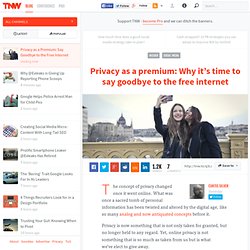
What was once a sacred tomb of personal information has been twisted and altered by the digital age, like so many analog and now antiquated concepts before it. Privacy is now something that is not only taken for granted, but no longer held to any regard. Yet, online privacy is not something that is so much as taken from us but is what we’ve elect to give away. There is a major shift on the horizon though; as users are starting to realize the consequences of freely giving their right to privacy. While we all seem to fear the NSA spying on us (a reasonable, albeit semantically ridiculous fear, as if the government has the proper staffing for that endeavor), we don’t seem to fear the general loss of identity as we give ourselves away piece by piece.
2013-oecd-privacy-guidelines.pdf. Storage and security of personal information (principle five) 31995L0046. Directive 95/46/EC of the European Parliament and of the Council of 24 October 1995 on the protection of individuals with regard to the processing of personal data and on the free movement of such data Official Journal L 281 , 23/11/1995 P. 0031 - 0050 of 24 October 1995 on the protection of individuals with regard to the processing of personal data and on the free movement of such data Having regard to the Treaty establishing the European Community, and in particular Article 100a thereof, Having regard to the proposal from the Commission (1), Having regard to the opinion of the Economic and Social Committee (2),
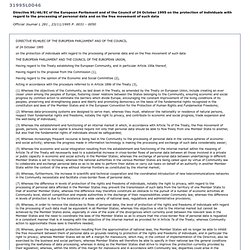
Export.gov - Safe Harbor Data Privacy Links. ITA Web Site Privacy Policy ITA Disclaimer OPA has developed guidelines for creating an effective privacy policy, establishing enforcement mechanisms, and protecting children's privacy online.
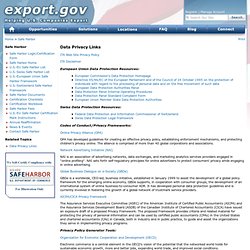
The alliance is comprised of more than 40 global corporations and associations. NAI is an association of advertising networks, data exchanges, and marketing analytics services providers engaged in "online profiling". NAI sets forth self-regulatory principles for online advertisers to protect consumers' privacy while engaging in online advertising. GBDe is a worldwide, CEO-led, business initiative, established in January 1999 to assist the development of a global policy framework for the emerging online economy.
Facebook’s privacy pivot: Mark Zuckerberg’s plan to win back trust. Photo by Justin Sullivan/Getty Images Courtesy of Facebook Remember when Mark Zuckerberg didn’t believe in privacy?
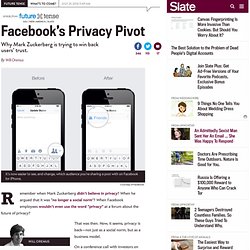
When he argued that it was “no longer a social norm”? When Facebook employees wouldn’t even use the word “privacy” at a forum about the future of privacy? Will Oremus is Slate's senior technology writer. That was then. On a conference call with investors on Wednesday, Zuckerberg singled out privacy features and private services like messaging and anonymous logins as keys to the company’s future growth. He’s right.
To be fair, Facebook’s about-face on privacy has been in the works behind the scenes for a while now. In the past six months, that shift in focus has become apparent. The clearest sign came in February with Facebook’s $19 billion acquisition of WhatsApp, a globally popular private-messaging app. Privacy as a Premium: Say Goodbye to the Free Internet.